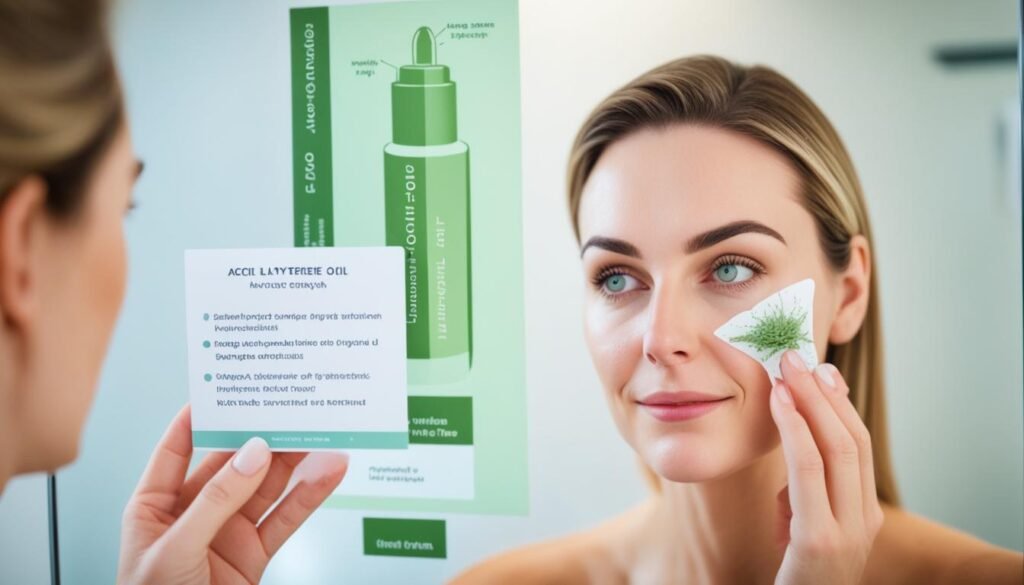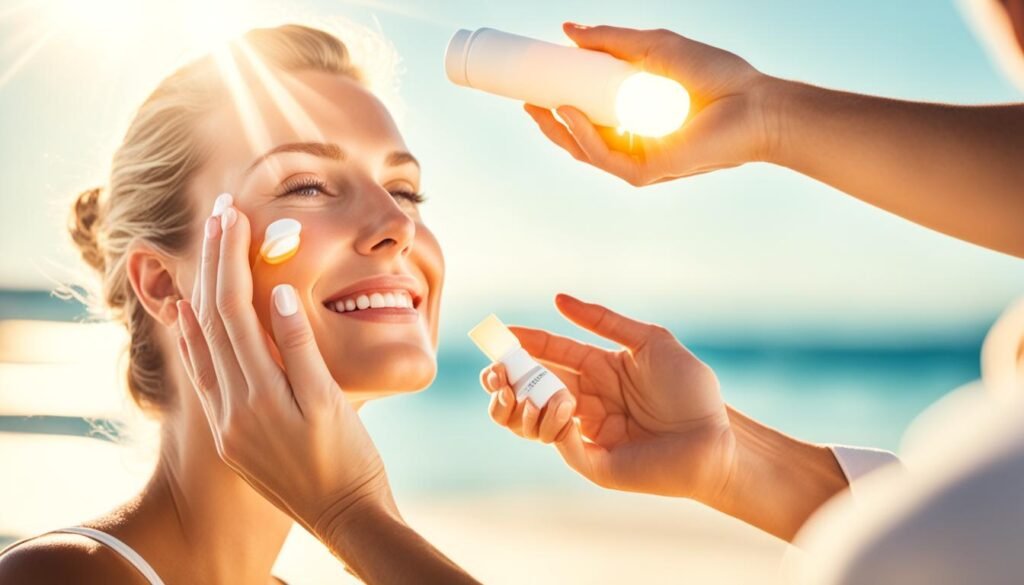Do you want to know how to take care of your skin like a dermatologist? Are you tired of trying endless skincare products and routines without seeing significant results? Look no further! We have gathered 10 expert skincare tips from top dermatologists that will revolutionize your skincare routine and give you the flawless complexion you’ve always dreamed of.
When it comes to skincare, dermatologists are the ultimate experts. Their extensive knowledge and experience allow them to provide invaluable advice that can transform your skin. Whether you’re struggling with acne, aging, or simply want to maintain healthy skin, these dermatologist-recommended tips will guide you towards your skincare goals.
Key Takeaways:
- Follow a daily skincare routine with dermatologist recommended products.
- Wear sunscreen every day to protect your skin from harmful UV rays.
- Perform monthly self-scanning exams to check for any signs of skin cancer.
- Moisturize your skin to keep it hydrated and healthy.
- Quit smoking to prevent skin damage and premature aging.
Wear sunscreen every day
Dermatologists emphasize the importance of wearing sunscreen daily to protect your skin from the harmful effects of the sun. Regardless of the weather or season, UV rays can impact your skin and lead to dryness and pigment changes. It is recommended to use sunscreen with an SPF of 30 or higher and opt for physical sunscreens that reflect the sun’s rays for maximum effectiveness. Reapply sunscreen every two hours, especially when exposed to the sun for extended periods, to avoid sunburns and maintain skin health.
The sunscreen provides a crucial shield against damaging UV rays, preventing sunburn and minimizing the risk of skin cancer. It forms a protective barrier on the skin, absorbing or reflecting harmful rays that can penetrate the skin’s surface. By wearing sunscreen every day, you prioritize your skin protection and contribute to maintaining its health and radiance.
Physical Sunscreen vs. Chemical Sunscreen
| Physical Sunscreen | Chemical Sunscreen |
|---|---|
| Contains mineral ingredients like titanium dioxide or zinc oxide | Contains organic compounds that absorb UV rays |
| Forms a protective barrier on the skin’s surface, reflecting UV rays away | Absorbs UV rays and converts them into heat, which is then released from the skin |
| Ideal for sensitive skin, as it is less likely to cause irritation | May cause skin irritation or allergic reactions in some individuals |
| Works immediately upon application | Requires approximately 20 minutes to fully absorb into the skin |
Check your skin for cancer every month
Skin cancers, including melanoma, are on the rise, and early detection is crucial for successful treatment. Dermatologists recommend performing monthly self-scanning exams to check for any changes in your skin. Pay attention to moles, birthmarks, and any existing skin conditions. Look for signs such as asymmetry, irregular borders, unusual colors, larger size, and evolving features. Any suspicious changes should be evaluated by a dermatologist, especially if accompanied by itching, bleeding, or rapid growth.
Regular self-exams allow you to become familiar with your skin’s normal appearance and better identify any abnormal changes. Catching skin cancer early greatly improves the chances of successful treatment and reduces the risk of complications.
“Early detection of skin cancer through self-examinations saves lives. Any new, changing, or concerning growths should be evaluated by a dermatologist as soon as possible.”
– Dr. Emily Roberts, Dermatology Specialist
To perform a self-skin exam, start by standing in front of a mirror and thoroughly examine your skin, including the areas that are often exposed to the sun. Use a handheld mirror or ask a partner to check hard-to-see areas, such as your scalp, back, and the bottoms of your feet.
Remember the following ABCDEs when evaluating moles and other skin growths:
ABCDE Rule
| Criteria | Description |
|---|---|
| A | Asymmetry: One half of the mole or growth doesn’t match the other half. |
| B | Border: The edges are irregular, blurred, or poorly defined. |
| C | Color: The color is uneven, with shades of tan, brown, black, or red. |
| D | Diameter: The size is larger than a pencil eraser, typically more than 6mm. |
| E | Evolving: The mole or growth changes in size, shape, color, or elevation. |
If you notice any changes or abnormalities that fit the ABCDE rule, make an appointment with a dermatologist immediately. They can conduct further evaluations and perform a biopsy if necessary to confirm a cancer diagnosis.
Early detection and prompt treatment are vital in the fight against skin cancer. Remember, your skin’s health is in your hands.

Moisturize your skin
As we age, our skin naturally becomes drier and more prone to irritation. Using a moisturizer is essential to keep the skin hydrated and healthy. Dermatologists recommend applying moisturizer within three minutes after showering to lock in moisture. Moisturized skin appears smoother and less wrinkled, and it helps protect the skin’s barrier function, preventing water loss.
When choosing a moisturizer, look for one that is specifically formulated for your skin type and concerns. If you have dry skin, opt for a rich, creamy moisturizer that provides intense hydration. For oily or combination skin, choose a lightweight, oil-free moisturizer that won’t clog pores.
Moisturizers work by trapping water in the outermost layer of the skin, preventing it from evaporating and leaving the skin dry and tight. They also help balance the oil glands, preventing excessive oil production and maintaining a healthy moisture level. This is especially important for individuals with dry skin, as their oil glands may not produce enough natural oils to keep the skin adequately hydrated.
In addition to hydrating the skin, moisturizers can also help alleviate skin sensitivity and reduce the appearance of fine lines and wrinkles. They create a protective barrier that shields the skin from external aggressors, such as pollution and harsh weather conditions. This barrier also helps soothe and calm any existing skin irritations or redness.
When applying a moisturizer, start with a clean face and gently massage the product into your skin using upward motions. Pay close attention to areas that are prone to dryness, such as the cheeks and forehead. For maximum benefits, use a moisturizer both in the morning and evening as part of your skincare routine.
Stop smoking
Smoking not only harms your overall health but also has detrimental effects on your skin. The toxins in tobacco smoke can cause significant damage to skin cells, leading to various skin issues.
One of the most visible effects of smoking on the skin is wrinkling and premature aging. The chemicals in cigarettes constrict blood vessels, reducing blood flow to the skin and depriving it of essential nutrients and oxygen. This lack of circulation can result in an increase in wrinkles and fine lines, making the skin appear older than it is.
In addition to wrinkling, smoking also impairs the skin’s healing process. The reduced blood flow caused by smoking makes it harder for wounds to heal, resulting in delayed healing times for cuts, burns, and other injuries.
Furthermore, smokers are more prone to acne and skin infections. The chemicals in cigarettes can disrupt the delicate balance of the skin, leading to clogged pores, increased oil production, and inflammation, all of which contribute to the development of acne. Smoking also weakens the immune system, making the skin more susceptible to infections.
To maintain healthy and youthful-looking skin, quitting smoking is essential. By eliminating cigarettes from your life, you can reduce the risk of skin damage, wrinkling, premature aging, delayed healing, and acne.
Acne isn’t a hygiene problem
Contrary to popular belief, acne is not caused by poor hygiene or infrequent face-washing. Acne is primarily driven by genetics and hormones. The development of acne is influenced by several factors, including an overproduction of oil by the oil glands, clogged pores, and the presence of bacteria on the skin.
To effectively treat acne, dermatologists recommend using specific ingredients that target the root causes. Two key ingredients that are commonly utilized are benzoyl peroxide and adapalene.
The Role of Benzoyl Peroxide
Benzoyl peroxide is an effective topical treatment for acne due to its ability to kill the bacteria that contribute to acne. It works by reducing the number of bacteria on the skin, thereby minimizing inflammation and preventing new breakouts.
When using benzoyl peroxide, it is important to start with a lower concentration to avoid potential skin irritation. Over time, you can gradually increase the strength if needed. It is also crucial to follow the instructions provided by your dermatologist or the product label to achieve the best results.
Although benzoyl peroxide can be effective in treating acne, it can also cause dryness and irritation. Therefore, it is crucial to use a moisturizer to keep the skin hydrated and balanced.
The Importance of Adapalene
Adapalene is a retinoid that works by keeping the pores clean and preventing them from becoming clogged. It helps to normalize the desquamation process, which controls the shedding of skin cells and reduces the risk of pore blockage.
In addition to keeping the pores clear, adapalene also regulates the activity of the oil glands. By reducing oil production, it helps reduce the likelihood of clogged pores and the development of new acne lesions.
Adapalene is available in different formulations, including gels, creams, and lotions. It is typically applied once daily, preferably at night, to clean, dry skin. Consistency is key when using adapalene, as it can take several weeks to see noticeable improvements in acne.
A Comprehensive Approach to Acne Treatment
While benzoyl peroxide and adapalene are powerful ingredients for treating acne, a comprehensive approach to skincare is recommended for optimal results. This may include gentle cleansing, regular exfoliation, and the use of non-comedogenic moisturizers.
It is important to consult with a dermatologist to develop an individualized treatment plan tailored to your specific skin concerns. They can assess the severity of your acne, identify any contributing factors, and recommend appropriate treatments.
To summarize, acne is not solely a hygiene problem and is influenced by genetics, hormones, and other factors. Benzoyl peroxide and adapalene are two key ingredients that target the underlying causes of acne, such as bacteria, oil production, and clogged pores. Utilizing these ingredients, along with a comprehensive skincare routine, can help to effectively manage and reduce acne breakouts.

Don’t pop your pimples
It can be tempting to pop a pimple to make it disappear faster, but dermatologists strongly advise against it. Popping pimples can introduce an infection and make inflammation worse, leading to increased scarring. Instead, spot-treat pimples with a topical benzoyl peroxide cream, which helps kill bacteria and reduce inflammation.
When you pop a pimple, you risk pushing bacteria and dirt deeper into the skin, causing an infection. This can result in a more severe breakout and even lead to long-term damage. Additionally, popping pimples can cause the surrounding area to become inflamed and red, making it more noticeable and harder to conceal.
Scarring is another potential consequence of popping pimples. When you pop a pimple, you disrupt the skin’s healing process, increasing the likelihood of scarring. The more frequently you pop your pimples, the more likely you are to develop acne scars that can be difficult to treat.
To effectively treat pimples without popping them, use a topical benzoyl peroxide cream. Benzoyl peroxide helps kill the bacteria that contribute to acne, reducing the risk of infection and promoting faster healing. Applying a thin layer of benzoyl peroxide cream directly on the pimple can help reduce inflammation and redness, leading to quicker resolution.
Benefits of using benzoyl peroxide cream for acne:
- Kills bacteria that contribute to acne
- Reduces inflammation and redness
- Promotes faster healing
- Helps prevent future breakouts
| Benzoyl Peroxide Cream | Benefits |
|---|---|
| Kills acne-causing bacteria | Reduces inflammation |
| Promotes faster healing | Prevents future breakouts |
Using a benzoyl peroxide cream is a safer and more effective approach to treating pimples compared to popping them. By following this dermatologist-recommended method, you can minimize the risk of infection, inflammation, and scarring while achieving clearer, healthier-looking skin.
Use a daily topical antioxidant
Our skin is constantly exposed to a variety of environmental pollutants and free radicals on a daily basis. These factors can contribute to oxidative damage, leading to premature aging, dullness, and other skin concerns. To combat this, it’s important to incorporate a daily topical antioxidant into your skincare routine.
One highly beneficial antioxidant for the skin is vitamin C. Vitamin C is known for its powerful ability to neutralize free radicals and protect the skin from damage caused by sun exposure and pollution. By incorporating a topical vitamin C product into your routine, you can help maintain healthier and more radiant skin.
Vitamin C not only provides protection against free radicals, but it also enhances the effectiveness of sunscreen. When used in combination with sunscreen, vitamin C can provide an added layer of defense against harmful UV rays.
Benefits of Using a Topical Antioxidant:
- Neutralizes free radicals: Topical antioxidants, such as vitamin C, neutralize free radicals that can damage and age the skin.
- Protects against sun damage: Vitamin C enhances the sun protection capabilities of sunscreen, helping to shield the skin from harmful UV rays.
- Brightens and evens out skin tone: Regular use of a topical antioxidant can help reduce the appearance of dark spots and hyperpigmentation, resulting in a more even complexion.
- Boosts collagen production: Vitamin C stimulates collagen production, improving the skin’s elasticity and reducing the appearance of fine lines and wrinkles.
- Improves overall skin health: By protecting the skin from oxidative damage, a topical antioxidant helps maintain the overall health and vitality of the skin.
Incorporating a daily topical antioxidant, such as vitamin C, into your skincare routine can help protect your skin from the damaging effects of free radicals and sun exposure, leading to healthier and more radiant skin.
Stay away from products with fragrance
Fragranced products may smell nice, but they can have negative effects on your skin. The artificial fragrances used in many skincare and household products can cause moisture loss, skin allergies, and irritation.
Dermatologists strongly recommend using fragrance-free products to minimize the risk of these issues. This applies not only to skincare products like moisturizers and serums but also to laundry detergents, dryer sheets, and body products.
If you find it challenging to avoid fragranced products completely, dermatologists suggest performing a patch test before using them extensively. Apply a small amount of the product to a discreet area of skin and wait for 24 hours. If there are no negative reactions such as redness, itching, or swelling, it is generally safe to continue using the product.
By prioritizing fragrance-free products, you can protect your skin from unnecessary irritation and maintain its health and well-being.
The Importance of Fragrance-Free Products
“Fragrances may add a pleasing scent to products, but they can cause a host of problems for the skin. From allergies and irritation to excessive dryness, fragranced products are best avoided. Opting for fragrance-free alternatives ensures that you’re not compromising your skin’s health in the pursuit of a pleasant fragrance.”
| Benefits of Fragrance-Free Products | Risks of Fragranced Products |
|---|---|
|
|
Use barebone ingredients
In the vast skincare market, it can be overwhelming to choose the right products among the multitude of options. To simplify your skincare routine and minimize potential irritations, dermatologists suggest opting for products with minimal, barebone ingredients that serve a specific purpose. When selecting skincare products, prioritize those formulated with gentle and natural ingredients.
Gentle skincare products with minimal ingredients help reduce the risk of skin sensitivities and reactions. By avoiding unnecessary additives and fillers, you can focus on using products that are more targeted and effective. Look for labels that promote minimalism and feature natural ingredients, such as aloe vera, chamomile, or green tea extracts, which are known for their soothing and calming properties.
If you have a skin condition that persists or worsens despite using simple measures, it is important to consult a dermatologist for expert guidance and personalized treatment. A dermatologist can help identify the underlying causes of your skin concerns and recommend specific skincare products tailored to your needs.

